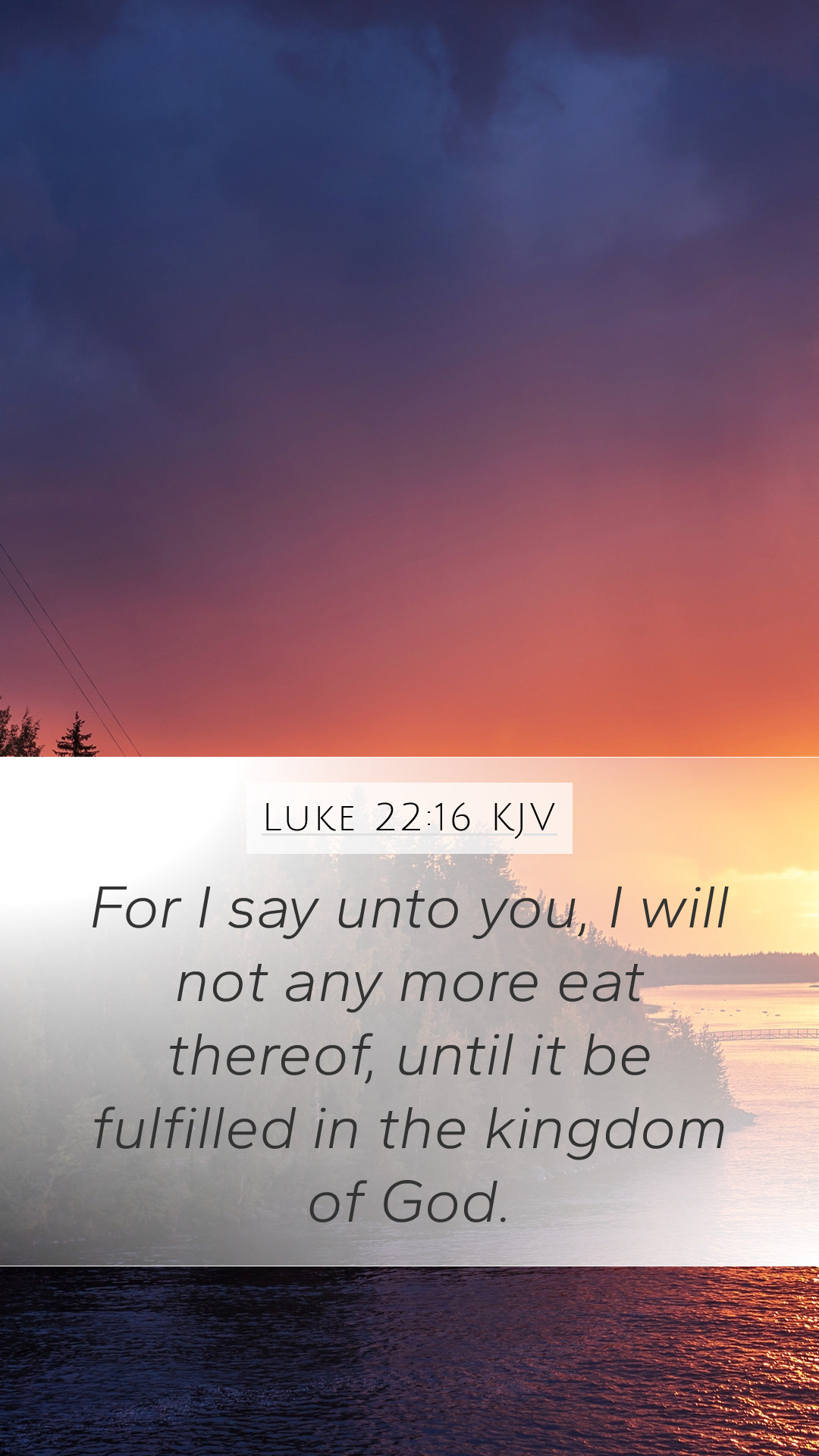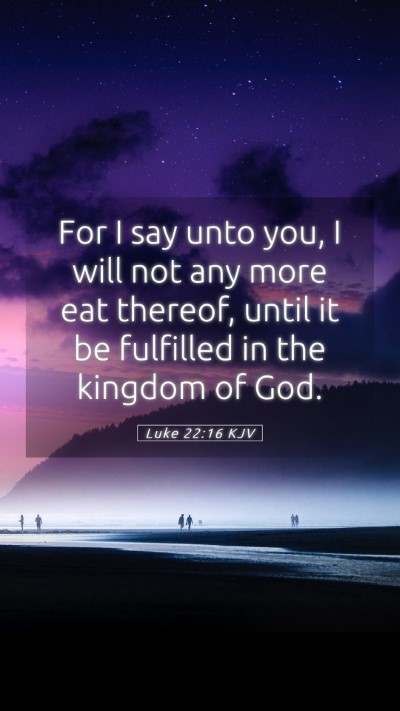Understanding Luke 22:16: A Comprehensive Analysis
In Luke 22:16, Jesus expresses the significance of sharing His last Passover meal with His disciples, stating, "For I say unto you, I will not any more eat thereof, until it be fulfilled in the kingdom of God." This verse is rich in theological insight and serves as a pivotal moment in the narrative of Jesus's life, marking the institution of the Lord's Supper.
Summary of Key Themes
- Fulfillment of Prophecy: Jesus indicates that the observance of the Passover will find its ultimate completion in the kingdom of God.
- The Significance of Communion: This meal represents the establishment of a new covenant between God and humanity through the sacrifice of Jesus.
- Preparation for the Passion: This provides a preparatory moment before His crucifixion, illuminating the gravity of His impending sacrifice.
Bible Verse Meanings and Interpretations
The depth of Luke 22:16 can be explored through several public domain commentaries, offering a variety of insights on its meaning.
Matthew Henry's Commentary
Matthew Henry highlights the gravity of the occasion, noting that Jesus's decision to share this final meal with His disciples was intentional. He emphasizes that this moment symbolizes the transition from the Jewish Passover to the new covenant, representing Christ Himself as the Passover Lamb who will be sacrificed for the sins of the world. Henry draws attention to the joy that is expected in the Messianic banquet, indicating that this last meal foreshadows the heavenly feast that believers will partake in.
Albert Barnes's Commentary
Albert Barnes focuses on the future promise Jesus makes regarding not eating the Passover again until it is fulfilled in the kingdom of God. This reflects both a sense of expectation and hope, where the fulfillment pertains to the broader kingdom of heaven and the ultimate restoration of God's people. Barnes points out that this declaration serves as a caution—encouraging the disciples to comprehend the seriousness of the moment and what is to come in the context of Jesus’s death and resurrection.
Adam Clarke's Commentary
Adam Clarke interprets this verse as a profound declaration of Christ's intention to institute a new form of worship through communion. He explains that the meal symbolizes a change in the relationship between God and humanity, highlighting the significance of the new covenant that Jesus will establish through His blood. Clarke emphasizes how this meal is not merely a remembrance of the Exodus but an establishment of an entirely new relational dynamic that invites believers into a covenant community.
Contextual Analysis
Luke 22:16 occurs within the larger narrative of the Last Supper. Jesus had gathered His disciples to commemorate the Passover, an annual Jewish celebration that commemorates the Exodus from Egypt. The Last Supper is significant not only as a historical event but also as a theological pivot point, transitioning from the old covenant practices to a new understanding of God's relationship with humanity through Christ's sacrifice.
Related Cross References
- Matthew 26:29: Jesus proclaims that He will not drink of this fruit of the vine again until He drinks it anew in His Father’s kingdom.
- Mark 14:25: Similar to Matthew, this verse underscores the promise of future fulfillment in God's kingdom.
- 1 Corinthians 11:25-26: Paul reflects on the meaning of the Lord’s Supper and its significance for believers in remembrance of Christ’s sacrifice.
Applying the Verse to Daily Life
Understanding Luke 22:16 invites believers to reflect on the significance of communion as more than a ritual; it becomes a moment of expectant anticipation for the fulfillment of God's kingdom. It encourages believers to live in a way that acknowledges the new covenant initiated by Christ through His sacrifice. This verse serves as a reminder to engage in communal worship and to participate actively in the life of the church as a foretaste of the heavenly banquet.
Conclusion
Luke 22:16 is a profound statement that encapsulates the transition from the Jewish Passover to the new form of communion established by Christ. Through the insights provided by public domain commentaries, one gains a richer understanding of its implications for faith and practice. As we delve into the Bible verse meanings and interpretations, we gain clarity on the biblical exegesis surrounding communion and its significance in the larger narrative of Scripture.
Additional Resources for Bible Study
For those seeking to deepen their understanding, consider utilizing Bible study tools, guides, and lessons that explore the meanings of various scriptures. Engaging in online Bible study groups can provide additional insights, as communal study often enriches personal reflection.


